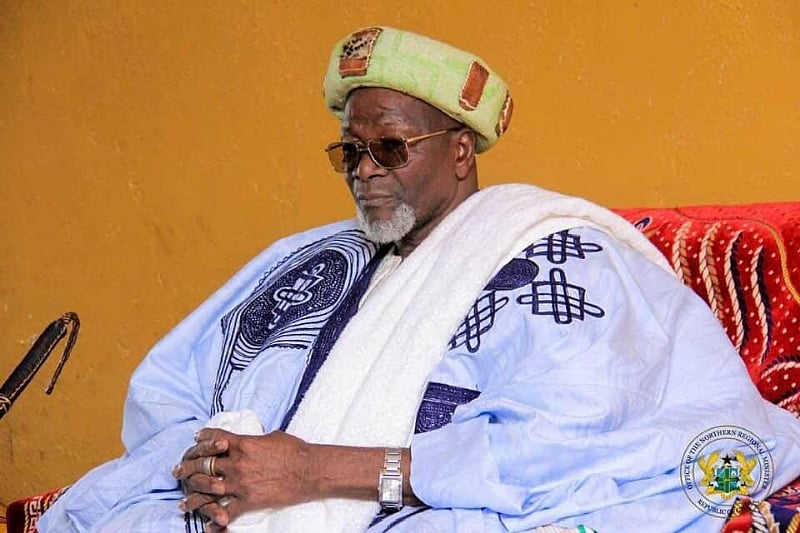A majestic roar has echoed from the Gbewaa Palace — the ‘Lion’ King, His Majesty Ndan Yaa Naa, has spoken, and with that, the entire Kingdom of Dagbon is gripped by a sacred silence. The war drums have ceased, and a wave of calm now envelops the land. Order is restored; respect for humanity, leadership, and rightful authority finds its footing once more. This is not a moment of fear but an opportunity — an invitation to reflect, to soul-search, and to reset for a new and better beginning.
Enough is enough: The Palace’s firm stand
“Enough is enough,” the Palace declared as preachers from factions within the Muslim community in Tamale were summoned before the King of Dagbon, Ndan Yaa Naa Abukari II on April 16th, 2025. This firm declaration was a direct call to overzealous religious preachers to pull back from the brink of division and conflict. It was a warning against the rise of factionalism and a plea to embrace unity. The Kingdom of Dagbon, rich in tradition and diversity, must not fall prey to disunity but must welcome tolerance across all Islamic schools of thought, foster community cohesion, and advocate for peace and development.
The Overlord speaks without mincing words
The Overlord did not mince his words. Revered as a Bridge-Builder, Peacemaker, Harmony-Seeker, and true Voice of Reason, the King stood firm. Without hesitation, he paid homage to those who fought to establish Islam in the Kingdom, including leading Mallams and Chiefs. Nonetheless, he also voiced deep concern over recent happenings in Tamale, where some Islamic preachers appeared driven not by faith but by a craving for leadership, popularity/visibility, and material gain. These developments, in his view, tarnish the spiritual dignity of the religion and sow seeds of unnecessary discord.
The King’s stern advice to religious preachers
With solemn conviction, the Yaa Naa took to the pulpit himself and reminded the faithful that the path of persuasion and diplomacy should define all religious discourse — just as it did in the time of Prophet Muhammad (SAW) over fourteen centuries ago. To those who offer no wisdom but only inflame tensions, the King offered simple advice: stay silent and give peace a chance or be ready to face his imminent wrath. The message was clear: “peace must prevail”.
Respect for traditional and religious harmony
The Palace also reminded all religious figures of the historic role the royal skins have played in elevating Islam within Dagbon. From the days of Naa Zanjina in the 17th century, the traditional authority has stood as a firm pillar supporting the spread of Islam. Consequently, any effort to sever Islam from Dagbon’s cherished cultural roots is both misguided and dangerous. The Palace welcomes religious preaching but condemns, in no uncertain terms, any derogatory statements directed at traditional beliefs or ancestral spiritual practices.
The elders’ bold intervention
Notably, the leader of the Elders in the Palace, Naa Yab Kug Naa, was equally emphatic, stressing that no threats of death, no verbal assaults, and no abuse of freedom — regardless of the platform — would be tolerated any longer in the Dagbon Kingdom. Moving forward, respect, dignity, and civility must become the norm, not the exception. Naa Yab Kug Naa also highlighted a glaring irony, stating that although 80–90% of Dagbon’s Chiefs are practising Muslims and command large Islamic followings, all manner of vices continue to thrive in Tamale — the very place where religious preachers continue to fight and insult one another. He questioned why the same energy is not directed toward fighting the vices Allah truly calls upon them to combat.
A call to collective action
This moment is not simply about warnings or condemnations but a call for collective action — a reminder that the burden of peace rests on all shoulders: religious leaders, traditional rulers, youth, elders, security officials, and every member of the Dagbon Kingdom Everyone must rise with urgency and purpose to ensure harmony and reduce poverty.
Strengthening security and monitoring
The Palace enjoins to the Northern Regional Security Council (REGSEC) to intensify efforts in maintaining order and mediating potential conflict. As the rest of the country embraces the new government’s development and reset agenda, Dagbon must not slip backward into unproductive religious factionalism. Let us archive the recent unrest as a low point in our religious history, learn from it, and move forward — not dwell in shame.
Proactive measures to sustain peace
Indeed, vigilance by REGSEC is crucial, particularly regarding social media activities that threaten peace. The Palace proposes that REGSEC set up a monitoring committee to track religious-related activities and identify divisive elements early, before chaos erupts. Additionally, a mandatory forum must be created to bring all preachers together — to dialogue, mingle, and organise workshops on religious freedom and tolerance. There should be no option except for those unwilling to continue as preachers. Chiefs, the police, lawyers, universities, NGOs, human rights organisations, and other civil society actors must all step in. If we fail to act now, posterity will judge us harshly. This should be a design by the REGSEC in collaboration with the Gbewaa Palace, Ministry of Chieftaincy and Religious Affairs and the Peace Council, drawing from expertise of the above mentioned professional bodies.
Let the Lion’s roar inspire unity
In this defining moment, may the voice of the “Lion” King be remembered not as a threat but as a call to unity and reason! Let it be said that when the King roared, Dagbon listened — and rose together, stronger, wiser, and more united than ever before.
By Dr. Abdul-Fatahi Abdulai


